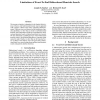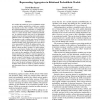AAAI
2015
9 years 9 months ago
2015
AAAI
2015
9 years 9 months ago
2015
The expressive power of a Gaussian process (GP) model comes at a cost of poor scalability in the data size. To improve its scalability, this paper presents a low-rank-cum-Markov a...
AAAI
2015
9 years 9 months ago
2015
Covariate shift correction allows one to perform inference even when the distribution of the covariates on the training set does not match those on the test set. This is achieved ...
AAAI
2015
9 years 9 months ago
2015
Markov Decision Problems, MDPs offer an effective mechanism for planning under uncertainty. However, due to unavoidable uncertainty over models, it is difficult to obtain an exac...
AAAI
2015
9 years 9 months ago
2015
We study a game with strategic vendors (the agents) who own multiple items and a single buyer with a submodular valuation function. The goal of the vendors is to maximize their re...
AAAI
2015
9 years 9 months ago
2015
Learning probabilistic predictive models that are well calibrated is critical for many prediction and decision-making tasks in artificial intelligence. In this paper we present a...
AAAI
2015
9 years 9 months ago
2015
We present an intuitive explanation for the limited effectiveness of front-to-end bidirectional heuristic search, supported with extensive evidence from many commonly-studied doma...
AAAI
2015
9 years 9 months ago
2015
Ensemble learning is among the state-of-the-art learning techniques, which trains and combines many base learners. Ensemble pruning removes some of the base learners of an ensembl...
AAAI
2015
9 years 9 months ago
2015
We consider the problem of, given a probabilistic model on a set of random variables, how to add a new variable that depends on the other variables, without changing the original ...
AAAI
2015
9 years 9 months ago
2015
We study strong equilibria in symmetric capacitated costsharing games. In these games, a graph with designated source s and sink t is given, and each edge is associated with some ...


